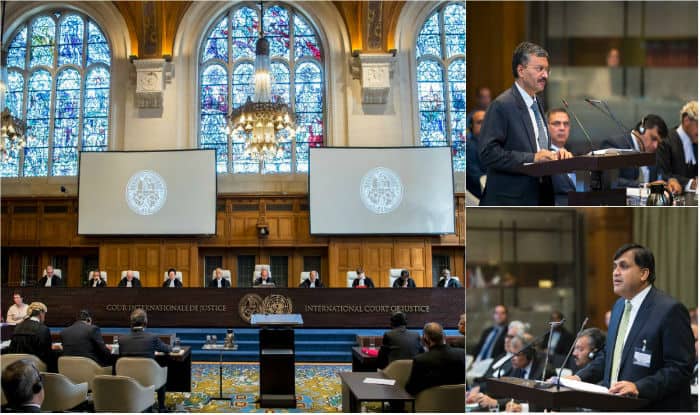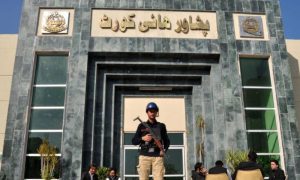THE HAGUE – The International Court of Justice has resumed hearing into the Indian spy Kulbhushan Jadhav’s case with Pakistani and Indian legal teams gathering at the Hague on Monday.
ICJ had earlier stayed the execution of Jadhav in July last year despite Pakistan’s arguments that the accused was a spy and there was no reason for him to be granted consular access.
On the first day of the hearing, India presented its arguments and kept reiterating its claims that Kulbhushan Jadhav should have been given consular access by Pakistan.
India’s Fresh Arguments before ICJ
In its arguments on February 18th, India has reiterated the allegations made earlier that the confession obtained from Jadhav appeared to be coaxed.

Advocate Harish Salve made the following arguments before the panel.
- Pakistan did not disclose the date of detention and no documents of Jadhav’s trial were provided.
- Jadhav’s continued custody without consular custody should be declared unlawful
- Pakistan has raised host of issues that have no relevance to the case
- India was dismayed with the manner in which Jadhav’s family met him
- Pakistan’s allegations are disrespectful and baseless
Pakistan’s Stance Against India
Pakistan has raised a few key points for the fresh hearings in The Hague beginning from February 18th, seeking answers from India.
- Proof of India’s allegations that Jadhav was kidnapped from Iran.
- Record of Jadhav’s retirement from the Navy as the spy is merely 47-years-old.
- How Jadhav was able to use a passport issued under fake credentials for entry to India 17 times. Uk expert confirmed that the passport was authentic.
- Why Jadhav did not file an appeal before local courts which grant a right to challenge the decisions under Article 199 of the constitution and why did India move ICJ directly to seek return of the commander.
- India failed to justify why both the countries should not invoke Agreement on Consular Access dated 21 May 2008 for consular access “on its merits”.
- India fails to explain why UK based Military Law experts are wrong when they say that Pakistan’s High Court and Supreme Court provide an effective review and reconsideration of the Military Court process.
Pakistan’s Replies Before ICJ
In its subsequent replies, Pakistan has raised few key points that the international customary law gives exceptions to the cases involving spies and so consular access is revoked in such type of cases.
The legal team of Pakistan has also contended that the consular access is subject to scrutiny when it comes to matters of national security.
Pakistan has asked the ICJ to consider whether India has acted
illegally in facilitating Commander Jadhav’s espionage/terrorism by providing him with the passport issued in name of ‘Hussein Mubarak Patel’.
Pakistan is also considering the precedents set by ICJ that it has never ordered relief of ‘acquittal, release and return’ such as that sought by India as it is not a criminal court.
Fresh Round of Hearings
Pakistan has continually pressed for the expedited hearing of this matter and ICJ has set a timetable for public hearings to be held on 18-21 February 2019 in The Hague.
As per the schedule, India will go first on 18 February 2019 (10:00-13:00 local time) following which Pakistan will make submissions on 19 February 2019 (10:00-13:00 local time).
Indian representative advocate Harish Salve presenting arguments before ICJIndia will reply on 20 February 2019 (15:00-16:30 local time).
Pakistan will make its closing submissions on 21 February 2019
(16:30-18:00 local time).
The much-anticipated ICJ decision may be delivered by the summer of 2019.
Pakistan’s Legal team
The legal arguments for the Government of Pakistan will be presented by English Queen’s Counsel Khawar Qureshi QC who also drafted the written pleadings.
The delegation is being formally led by the Attorney General of Pakistan, Anwar Mansoor.

Pakistan had already appointed its ad-hoc judge, former chief justice Tasadduq Hussain Jilani to the bench. Spokesperson Foreign Office, Dr Faisal is also accompanying the team.

The Court is now adjourned and will resume at 02:30 pm IST tomorrow (February 19) for Pakistan’s arguments.
Who is Kulbhushan Jadhav?
Kulbhushan Jadhav was arrested by Pakistan in March 2016. Jadhav confessed to being an Indian spy and admitted that he was involved in subversive activities in Pakistan.
After a confessional statement before a magistrate, he was sentenced to death by a military court in 2017.
Jadhav did not file an appeal against the sentence though Pakistani courts have in past overturned the verdicts handed down by military courts multiple times.
India Moves ICJ
India filed a petition with the International Court of Justice seeking to overturn the conviction. India contended that Pakistan did not grant consular access to Jadhav – failing to justify why should a spy be granted the leverage.
ICJ Stays Execution
Despite Pakistan’s appeal that Article 36 of the Vienna Convention on Consular Relations (VCCR) did not apply to spies, ICJ asked the Pakistani government to stay the execution.














